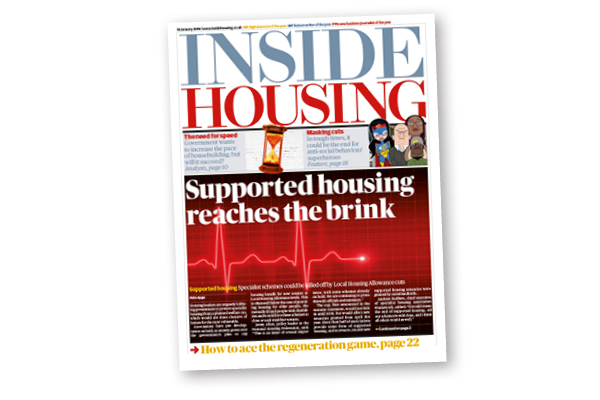You are viewing 1 of your 1 free articles
The supported housing funding saga: a timeline
The government’s decision to drop a shake-up of supported housing funding brings an end to uncertainty that’s lasted for nearly three years. Peter Apps looks back at how the story emerged.
The government announced over night that all supported housing funding will be covered by the welfare system, bringing an end to a plan to fund short term accommodation through council grants.
The announcement should provide much-needed certainty for providers seeking to provide supported housing and has been warmly welcomed by the sector.
Below is a reminder of what has unfolded over the last few years.
How the supported housing saga unfolded
November 2015: As a footnote to his Autumn Statement, chancellor George Osborne announces housing benefit will be capped at Local Housing Allowance (LHA) rates from 2018. The implication of this is not immediately clear.
December 2015: As it becomes clear that the policy will affect supported housing schemes, care providers warn that the policy will “kill off” supported housing. On Christmas Eve, Labour releases analysis showing the policy could affect 440,000 people nationwide.
January 2016: In response to an Inside Housing survey, 95% of supported housing providers said they would be forced to wind up schemes if the policy was introduced in full. The government announces a review of supported housing funding at the end of the month, promising more detail by spring.
March 2016: The government pushes back the implementation of the LHA cap from tenancies starting in 2016 to those beginning in 2017, but this fails to provide enough certainty for the sector to start building out schemes they have paused due to the uncertainty.
July 2016: With schemes still frozen, the government extends the exemption for supported housing indefinitely while it works on a long-term funding solution, but providers warn they still do not have enough certainty to restart building work. Inside Housing research reveals 73% of housing associations would be less likely to house under-35s if the policy were to go ahead.
September 2016: The government reveals its new funding plan: councils will be given top-up funding pots to cover the shortfall between rents and the new housing benefit rates supported housing tenants can claim. Providers express fears that this funding does not provide certainty and would be vulnerable to budget cuts.
November 2016: Ahead of the Budget, the government announces the cut will apply to existing tenants on Universal Credit, rather than just new tenancies. The sector warns that this will create a bedroom tax-style scenario, with tenants struggling to find the money to cover their rent.
March 2017: Research by the Chartered Institute of Housing reveals LHA rates have slipped so far behind actual rents, under-35s have no access to housing through benefits in many areas. Meanwhile, a top civil servant admits that the only reason the government is using LHA to set housing benefit is “they are already there”.
May 2017: Communities and Local Government and Work and Pensions select committees publish seminal reports calling on the government to ditch LHA as a means for setting benefit in supported housing.
August 2017: The National Housing Federation releases research showing housing associations have slashed planned supported housing developments by 85% due to the uncertainty over future funding.
October 2017: Facing pressure from Labour and crumbling support for the policy on her own benches, Ms May makes the surprise announcement that the policy is to be scrapped outright: LHA rates will no longer be used to set housing benefit in the social housing sector. The government outlines a consultation a week later which sets out plans for a new ’sheltered rent’ for long-term supported housing. Short-term supported housing, such as hostels and refuges, will however be subject to top-up funding from local authorities.
Theresa May announced the LHA cap would not go ahead (picture:Shutterstock)
November 2017: The reaction to this change from the sector is tempered by concerns over what it means for vital housing schemes – such as homeless refuges and domestic violence shelters. Alan Fraser, chief executive of YMCA Birmingham, says the new proposals are “even worse” and will leave providers of these types of accommodation “at the mercy of hard-pressed councils”.
April 2018: Following a consultation on the new proposals, which closed in January, the government publishes a brief summary of responses. It notes concern over the plans for short-term housing with “a number of providers urging the government to reverse its position”. A final response is promised by the summer.
August 2018: The government reveals it will drop plans to provide top-up funding through councils for both short and long-term supported housing, bringing to an end two-and-a-half years of uncertainty. The decision is warmly welcomed by the housing sector.
Some of the information in this timeline was first published on 25 October 2017.














